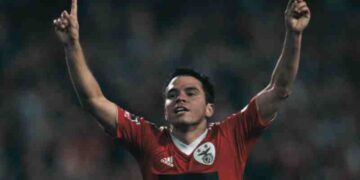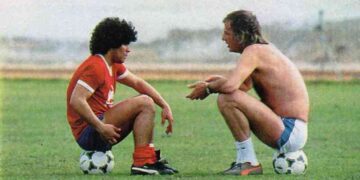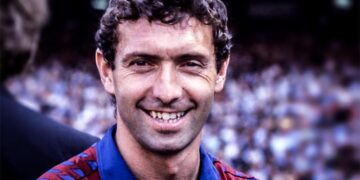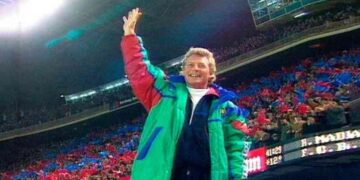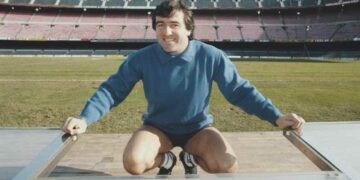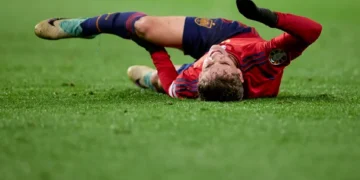Just as Vincent van Gogh’s sweeping paint was not appreciated in his lifetime, just as Desiderius Erasmus was constantly followed with suspicion by conservative fellow priests and other clergy, not everyone saw Hendrikus Johannes Cruyff and his football ideas. ‘You’ve been disturbed until you’re a genius’, that’s how he himself described this phenomenon in Cruyffian language.
This is Part 14 of #TheCruyffStory Series. You can read all the parts here.
That colorful, sometimes even endearing Cruyffian language was an important reason that the masses quickly lost the thread once he had taken the floor. Because yes, what do you do with this sentence, pronounced in his days as an analyst for the NOS:
“All the lineups you see, with a double defender, or what do you call that, a double midfielder of two men, or whatever you may call it, that provokes that the backs, or the wingers have to walk way too much, whereas so if you take three midfielders with the tip to the back, then the right midfielder is, he only has to walk five or ten meters to the side and then the right winger has to walk less, and the same on the left side.’
And what do you do with this argumentation, when journalist Tom Egbers asked the analyst on duty Cruyff a question about Zlatan Ibrahimovic in February 2003 after the Champions League match Ajax-Arsenal (0-0), but soon seemed to regret it:
‘Well, in shape… Let’s say: he has a good technique for a bad footballer and he has a bad technique for a good footballer. That is to say: almost everything at the highest level goes too slowly. As a result, he has a lot of ball loss, like today. That you say: look, the simple balls, they must always be perfect. With a good football player, that’s always….you never see Bergkamp making such stupid mistakes.’
Johan Cruyff was probably the only football analyst who did not care that not all his wisdom came across loud and clear, that the general public for television even regularly lost track. The current affairs program NOVA once paid attention to his inimitable use of language.
‘Do you have anything to do with the Dutch language?’, the questioner wondered aloud. “Eh, they sometimes laugh at me about it,” Cruyff replied with a grin on his face. ‘I sometimes don’t seem to formulate it well. But in general, everyone understands me.’
‘And do you choose your formulations consciously or is that a natural gift?’
“No, no, no,” Cruyff denied. ‘It’s actually that I think faster than I talk. Often I’m already past it and then I still have to say it.’
The Cruyffian language is of course not the only reason that people of flesh and blood could not always keep up with him. He was like the chess player who always thought a number of moves ahead. He was the rebel who also liked to kick his opponenets. Cruyff was at his best at times when tension could be cut, believing that resentment was an excellent motivator. And even as an advisor or revolutionary at Barcelona and Ajax, he did not shy away from confrontation. On the contrary. It was part of moving forward, that was his sacred conviction.
A kite only takes off against the wind
“In any case, I am not someone who lets himself be told how to do it,” he said about it himself. ‘But anyway, that’s also part of your status. The worst can never change things. So who else should do it?’ In other words: it was his fate.
One consequence was that on the way to the big goal sometimes a comrade-in-arms dropped out, even a good friend sometimes. Marco van Basten, for example, who was the ideal candidate to take Ajax by the hand during Cruyff’s Velvet Revolution, but ultimately collided head-on with his former example. Van Basten did not agree with Cruyff’s aggressive way of fighting in Amsterdam – there were a lot of victims – and described Plan Cruyff as ‘one big comedy’.
‘I have Johan in my head as a very nice guy’, van Basten explained in his column in football magazine VI at the time. ‘Warm, cozy, has a wealth of experience. We’ve known each other for a long time. I played against and with him. He’s been my trainer and coach. I came to his house. We stood together on the golf course. But when we got a joke years ago about the way Ajax should be managed, he really went on the attack. The tone surprised me. He became fierce and unreasonable. I didn’t agree. Then we broke up. “You’ll find out,” Johan said. Well, I waited a few years and I still don’t know what he meant.’
Guys here in Australia sometimes ask me questions about it. Like, “Was it your idea?” But then I have to laugh. What do you think? I was 21 years old and Cruyff 37.’
Thinking outside the box
Few wingers could dribble as wonderfully as Jesper Olsen. But as the years go by, the little Dane with the two striking front teeth is increasingly identified with The Penalty.
“We had practiced,” Olsen once told VI. ‘Exactly as we finally executed it. So also that Johan would lay the ball just as well. But that was months before that game against Helmond Sport. So when Johan told me we were going to do it, I was bloody nervous. It could have gone completely wrong.’
But it didn’t go wrong. And the penalty in threes – Cruyff to Olsen, Olsen to Cruyff, goal Cruyff – went around the world. This year, on 5 December to be precise, it will be forty years old, but it is still fresh in everyone’s memory.’
It is one of the countless examples of how Johan Cruyff could leave everyone in despair. Including colleagues, and later, when he became a coach, his players. What also didn’t help is that he sometimes did things that he himself could not even explain. ‘In certain situations, you also rely on your intuition,’ Cruyff said. ‘You sometimes draft someone and you still don’t know why.’
What shall we train today?
He himself realized that this was quite peculiar. Although Cruyff once stated that he never actually prepared a training session – ‘When I got up, I often thought: What shall we train on today’ – he stressed in his time at Barcelona that it was not just him, that unorthodox way of guiding a team. His assistant Charly Rexach was just like that. ‘When we talk about the set-up, Rexach always says that we first have to reduce the group from 20 to 16. Those 11 will come later. We sometimes have insane discussions. If we can’t get out of it, Rexach takes a coin and wants to draw lots. Brilliant man, that Rexach. If an outsider were among them, he would think that he is among a bunch of insane people.’
In order to ensure that players picked up something, Cruyff constantly sought the discussion. He pushed, scolded, annoyed and challenged. But better yet, he set up the exercise in such a way that players were forced to train on something. That he didn’t explain anything, but just let them do something or not do something.
Let the players understand different aspects of the game
Former Ajax coach Peter Bosz, now manager of Olympique Lyonnais, once saw up close how Cruyff wanted to get goalkeepers and defenders to train more in youth on building up. ‘Cruyff, for example, thought that the goalkeeper should not actually shoot out. In youth, they don’t throw to the center line, he knew. And then the defenders will have to offer themselves. You don’t have to explain that to them further, but they will do it automatically.’
And so you could let players learn lessons in many ways. Put a right winger at right back and he will find out what a right back finds most annoying about a winger. Put a striker last man, a last man in the striker. At first such a boy understands little of it, but in the end it is: Aaah yes, that’s what he meant by that…
The Power of Versatility
Cruyff automatically created versatile players. ‘The ideal is a team of such players who can change positions at any time without the team becoming less of it. As a result, you can vary the game in such a way that it is slightly different than the opponent expects.’
And in this way he also taught his players to come up with solutions to a problem themselves. Find out for yourself. With which she was taught what football is all about: thinking about what you do. Self-initiative.
It’s not a coincidence that so many former players of Cruyff later made it to the top of international football. Think of Pep Guardiola, Ronald Koeman, Frank Rijkaard, Dennis Bergkamp and Marco van Basten who had the Dutch team play great matches against Italy and France in 2008. But not only were they heavily inspired by Cruyff to play adventurous, attacking, dominant football, so were other coaches and players. And they all did not take Number 14 too literally, they quickly realized that they could give their own twist to the ideas.
‘Do I think it would be an ideal if my football vision were to be adopted internationally?’, Cruyff repeated the question of a VI reporter one day. ‘I would like that for football, but I don’t consider that an ideal. That football in itself is my ideal, because I love it so much. The fun is the most important thing, not only for the people, but also for the footballers. Because football still belongs to the footballers.’
It’s not for nothing that he said before every game: ‘Guys, go on the field and enjoy.’
Ricardo Moniz, former player of FC Eindhoven, Haarlem and RKC, among others, is not the first name that pops through your head with the term Cruyff apostles. But try to find a more dedicated following in professional football. The 1 meter 67 small defender had a colorful coaching career, was already active in ten different countries. From Ferencváros to the United Arab Emirates.
And everywhere he applies the theory of football training guru Wiel Coerver and Johan Cruyff. His devotion to the latter even goes so far that he has set up a small museum about him. ‘Cruyff once cost me my relationship. She didn’t like the fact that I was looking at those images all day.’
Probably no footballer or coach owes more to Johan Cruyff than Pep Guardiola. In the first week that the Dutchman was coach of Barcelona, he visited a game of the B-team. The tall thin guy on the right side of midfield immediately caught his eye and he stepped towards Charly Rexach, the coach of the youth team. Try him in the second half centrally in midfield, was the request of Cruyff.
Guardiola. The metronome, the clever compass just in front of the defense was born. And eventually became the distribution station and the game accelerator of the Dream Team that won the European Cup I in 1992. Was also picked away as a coach by Cruyff at Barça B and the rest is history. As far as the future is concerned, Guardiola hopes to lead Manchester City to his first Champions League victory with wonderful attacking combination football full of Cruyff influences.
Influenting a generation of coaches around the world
“Unfortunately, a good coach is coming to United. With 1899 Hoffenheim and RB Leipzig, he put two clubs on the map out of nowhere.’ According to Jürgen Klopp about his compatriot Ralf Rangnick when he arrived at Old Trafford. “He once opened my eyes as a player, and later also as a coach,” Thomas Tuchel responded to the news.
‘That was back in the days when German defenders thought they only had one task: to follow the opponent’s attackers, all the way to the toilet, haha.’ And Rangnick is also special to Julian Nagelsmann, the man was his mentor for many years. “He will do Manchester United a lot of good,” was the expectation of the current Bayern coach. Rangnick is considered the spiritual father of the German success trainers, a spiritual father with a touch of Cruyff.
His wildest dream shattered at the end of last year. Ronald Koeman was sacked at Barcelona and will therefore not be the coach who guides the club to new heights. A mission for which he even gave up a European Championship with the Orange. It will feel like a slap in the face, but at the same time he will forever remain Snowflake, the man who shot the club to its first Cup with Big Ears.
As a figurehead of Johan Cruyff’s masterpiece, the Dream Team. While Barcelona seem to have taken the road back up under Xavi, a better future also looms for Koeman. After the 2022 World Cup, he will take over from Louis van Gaal and return to the bench with the Dutch national team. With which a realistic version of Cruyff will take the reins firmly back into the hands of national pride. ‘I thought Johan was sometimes too attacking, but that’s how you develop your own vision.’
Bottom Line
In Camp Nou, a Cruyff has been walking around for a while. Jordi was appointed as a technical advisor to pull the club out of the doldrums again and with the winter arrival of Ferran Torres, Pierre-Emerick Aubameyang and Dani Alves, Xavi’s selection has received a big boost. Since then, the club has fared a lot better sportingly. An extra plus of Jordi’s physical presence is that the spirit of Johan Cruyff is more emphatically haunted in Barcelona. “I’m sure he would have been positive about the future of this club.”
Discover more from Barça Buzz
Subscribe to get the latest posts sent to your email.

